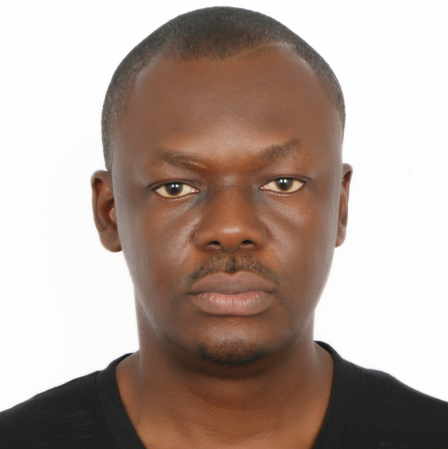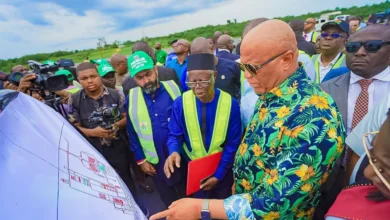
On this cold morning of 3 June 2023 Jonah Gbemre, a native of Iwerekhan community in Ughelli South Local Government Area of Delta State, Nigeria is in high spirits. As he spoke painfully about the plight of this once boisterous community, his bloodshot eyes reflected the anguish his people have suffered from years of exposure to the noxious fumes from the gas flare stacks that surround the community. Periodically he suffers severe eye pain and discomfort, and the community is no longer what he recalls growing up. But Gbemre is a fighter determined not to let Shell Petroleum Development Company (SPDC) and ND Western, the new owners of the Utorogu Gas Plant rest.
The Utorogu gas field in western Niger Delta is the second largest gas gathering and processing facility for the supply of natural gas to the domestic Nigerian market. The plant was initially operated by SPDC before it assigned 30% of its interest in Oil Mining Lease 34 (OML-34) to ND Western Limited. Total cash proceeds for Shell amounted to about $400 million. ND Western is an independent Nigerian oil and gas exploration and production company made up of a consortium of four companies: Niger Delta Petroleum Resources Limited (NDPR), Petrolin Trading Limited (PETROLIN), FIRST Exploration & Petroleum Development OML 34 Limited and Walter-Smith Exploration and Production Limited. It was incorporated on 20 April 2011 as a Special Purpose Vehicle to acquire the jointly held 45% participating interest of SPDC, Total E&P Nigeria Limited and Nigerian Agip Oil Company (NAOC) Limited in Oil Mining Lease (OML) 34. Contracts for the transfer of the assets were exchanged on 17 June 2011.
Like SPDC, the new owners of the Utorogu Plant feel they owe the locals no obligation.

In 2005 Jonah had sued SPDC for engaging in massive and unceasing intense gas flaring in the community, during its exploration and production activities. He maintained that the company failed to consider the environmental impact of its activities on the communities’ means of livelihood, collective survival, as well as the gas flaring’s contribution to the adverse and potentially life-threatening effects of climate change.
The case was expedited and the ruling was on point: On 14 November 2005 the judge, V.C. Nwokorie declared that the constitutionally guaranteed rights of the Iwerekhan community inevitably include the rights to a clean, poison and pollution-free environment and that the actions of SPDC in allowing flaring of gas in the community is a violation of their fundamental rights to a clean and healthy environment. The judge further ruled that Shell’s failure to carry out an Environmental Impact Assessment (EIA) is a clear violation of Nigeria’s EIA Act and a violation of said rights. He ordered the company to take immediate steps to stop gas flaring.
He also urged the Attorney General of Nigeria to ensure speedy amendment of the Associated Gas Re-injection Act to be in line with Nigeria’s human rights obligations under both the Constitution and the African Charter. Unfortunately, the ruling was not carried out and the judge was subsequently transferred from the jurisdiction.
For 18 years after that ruling gas flares continued in Utorogu. SPDC was not held liable for the allegations that the Iwerekhan community took it to court for. Instead, SPDC has been allowed to walk away through the change of ownership of the Utorogu Plant to ND Western, an indigenous firm.
In a recently built town hall in his community already showing signs of cracks from unending seismic vibration from the flare site, Jonah encourages the roughly thirty or so locals to gather for a meeting to deliberate the way forward for the community to keep hope alive. For most of the participants, they are already used to visits by non-governmental organisations interested in championing their plight but nothing tangible has come out of those visits.
In 2005, Environmental Rights Action, the Nigerian chapter of Friends of the Earth International encouraged them to go to court. They recall that the group mustered national and global outrage and attention to the issue. Though justice did not come, they recall that it was the amplification of the issue by the organization that made the Nigerian community hear of Iwerekhan.In the meeting which had both the young and old, in attendance they shared experiences and rekindled their hopes that with heightened agitation they may finally get justice. It was also an opportunity to express their frustrations on the failure of the Nigerian authorities to enforce the court judgment against SPDC for gassing their community into poverty.
A 62-year-old Chief Jyha Ogodien lamented that before SPDC came, the locals enjoyed the community. He narrated that fishermen enjoyed fish from the river and the swamp and farmers made sufficient money to take care of their children and take them to school. He said there are no more lands to plant crops and the flare sites cause massive heat in the community despite the rain.
No one enjoys fresh air anymore in the community. Our movement is restricted because we can’t traverse the paths that we formally farmed near the flare sites. Our children are suffering the pain and we regularly take them to the hospitals for one ailment and the other. The flares have brought serious hardship to us, we will be glad if this could stop.”
On the restriction of movement within the community, Jonah Gbemre revealed that the only road to the flare site is guarded by military men who ensure that everyone traversing the route is not a troublemaker, the label for those agitating against gas flaring in the community.
Also, 75-year-old Mary Fresh said that before the flare stacks were erected, the river in the community was good to drink but the reverse is the situation now. Unfortunately, our children are now prone to strange illnesses and regularly experience coughs and rashes.

“The thick smoke causes coughs in the children. That is one aspect. Another is the large tracts of land the companies have taken from us. The remaining little land we have has been taken over by cows owned by strangers”.
Re-echoing her view, 45-year-old Jenniffer Bimode lamented that the women used to dry their kopkpo garri, a local snack made from cassava in the open before the flare stacks were erected. She explained that since there is no more open space in the community, they take their produce to the very hot environment near the stack to dry them. Unfortunately, “we are now hearing that the exposure of the produce to the heat from the flares can contaminate the produce and cause cancer”.
76-year-old Elder Victor Owokere explained that the community produced a lot of things before
SPDC came but those things can’t be found anymore…” There is no land for cassava planting anymore. The oil and the spills that have erupted in several parts of this community are still in our swamps. Just this morning, I tried again to fish but caught nothing and had to manage to clean the spills on my legs.”
Expressing his frustration, he said: “We have cried and cried, yet nobody listens to us. We are not represented at all. If we were represented, the Government would have listened to us. We are left alone…. It is by God’s grace that I am 76 years. All my mates are dead.”
Read Also: Breaking: Appeal Court reverses Elumelu’s victory, declares Okolie winner
Houses not Spared
It was observed that the houses within the vicinity of the Utorogu Plant also bear marks of the regular seismic activities especially cracks and rusty roofs due to regular acid rain in the community. The locals said the cracks were because of the vibrations from the Utorogu Plant which happens intermittently and usually without notice. They said that kids and the old are usually startled whenever the vibrations occur.
Jude, the elder brother of Jonah revealed that many of the community people suffer from high blood pressure due to the suddenness of explosions from the plant even he added that another fallout of the vibration is the fact that about 90% of the houses in Iwherekan bear crack marks.
Summing up the challenges of the Iwerekhan Community, Jonah insisted that it is a daily struggle with noxious fumes, unproductive and unavailable farmlands, terrifying seismic vibrations often accompanied by shocks and waves from the plants and heavy cracks on the walls. “We are being terrorized on all fronts”.
What form will justice take?
At the end of the meeting, Jonah reiterated the community demands, which include the urgent need for the government to enforce the 2007 judgment and compensation for the community for years of disregard of the ruling.

They also want urgent environmental audits in the community which should include geophysical and soil strength audits to ascertain the state of the community soil. They want regular medical examinations for vulnerable members of the community including the aged, pregnant women, children, and persons living with disabilities, among others.
Jonah maintained that the Iwerekhan Community will not relent until they get the attention of the Nigerian government and the global community. He referenced the Ogoni struggle and the victory that four fisher folks from the Niger Delta region secured after 18 years in court as a consolation for the Iwerekhan people.
“The Ogoni have got justice finally. The example of their relentless agitation even in the face of brutal repression reinforces our conviction that we too will get justice someday if we stay on course. It may not be very near, but it is also not too far away,” he insisted.
Follow The Trumpet on all our social media platforms for more updates:




